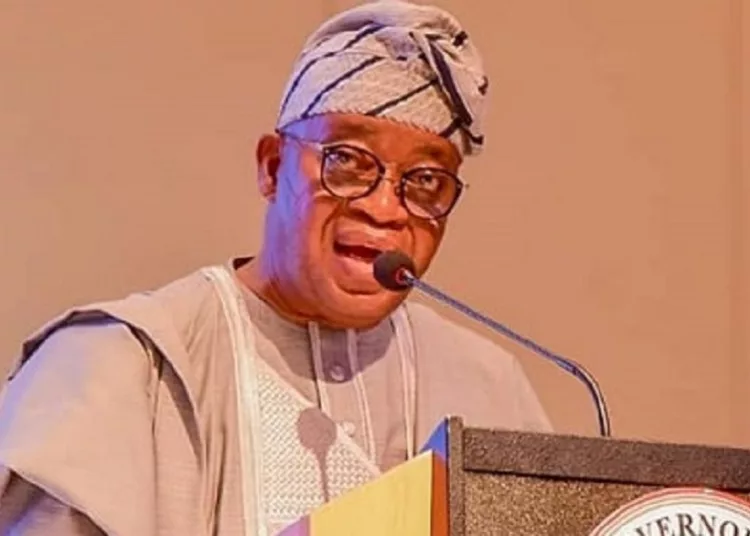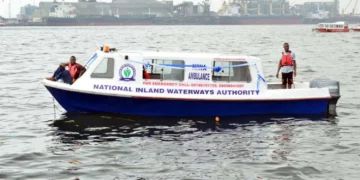The minister of Marine and Blue Economy, Adegboyega Oyetola on Thursday disclosed that the primary objective behind modernisation of the nation’s ports is to ensure that they become a transshipment hub in Africa sub-region.
The minister who stated this at an interactive session with members of the Nigerian Guild of Editors (NGE) in Lagos said the Federal Executive Council last week approved the award of contract for the modernisation of the Western Ports (Lagos Port Complex, Apapa & Tin-Can Island Port Complex, Apapa with a completion period of 48 months.
Oyetola said, ‘’ The modernisation of seaports remains a top priority of this administration. The procurement process for the modernisation of the Eastern Ports is being fast tracked. The goal is to ensure that our port system collectively becomes the transshipment hub for the sub-region. When the modernisation is completed, the draft of our port will be 16 – 17 meters. It is currently 12 – 13 meters. This will allow bigger vessels to berth and reverse the revenue loss to neighbouring ports of Tema, Lome and Cotonou. These port rehabilitation projects by NPA, are expected to generate over 20,000 jobs.’’
The minister said to bridge the infrastructure gap, the ministry is promoting Public-Private Partnership (PPP) to attract private-sector investment in port modernization, channel dredging, automation, inland waterways development, ferry/cruise services, cargo handling equipment deployment, terminal operations, and technological innovation.
‘’Additionally, we are extending necessary support to private investors to encourage participation in greenfield port projects such as Badagry, Ilaje, Olokola, Agge, Ibaka, Burutu, Snake Island, Bakassi, Deep Sea Ports as well as the development of river ports and jetties across the country.’
According to him, Inland Dry Ports are being developed across the country to enhance trade facilitation, explaining that the ports serve as cargo handling and clearance hubs, improving logistics efficiency and easing access to international markets.
Still dwelling on the achievements recorded by the current administration, he said the Funtua Dry Port in Katsina State was commissioned, adding that similar facilities in Kano and Kaduna are already supporting trade operations.
‘’Dry port development in Abia, Plateau, and Borno states are at various stages of development, to further strengthen the nation’s trade infrastructure. Additional dry ports in Oyo, Ogun and other states are planned.
‘’The ministry is working closely with the Federal Ministry of Transportation and Federal Ministry of Works to rehabilitate internal access roads and improve port connectivity, reducing congestion and transit time. Furthermore, we are leveraging on the Lagos-Calabar Coastal Highway to drive blue tourism, support fisheries industries, promote eco-tourism.’’
Harping on port operational efficiency, the minister said the government is implementing the National Single Window (NSW) project.
‘’To further enhance trade facilitation. This digital platform will streamline trade compliance processes, link ports with relevant government agencies and stakeholders and create a seamless, efficient system. To complement this NSW, the Ministry and NPA are finalising the Port Community System, an electronic platform to centralise and automate processes among stakeholders in port services. Mr. President has provided the political will and support for the take-off of the project, which holds the capacity to increase cargo dwell time at the Nigerian Seaports. The Port Community System (PCS), will serve as a One Stop Shop for all the stakeholders in the Port System.
‘’It is part of the digitalisation of port processes and operations. NPA is working hard to institute the PCS. The Ministry has initiated consultations to reduce the number of agencies at the seaports to a maximum of seven. This is to fast-track port processes and improve ease of doing business.’’
He said the ministry, through NPA is driving an agenda to deploy technology at the ports for enhance operational efficiency, saying the initiative includes the deployment of scanners by the Nigeria Customs Service to improve transparency at the ports; Vessel Tracking System; E-Regulatory Process Portal; International Cargo Tracking Note to boost revenue and guarantee security; and Truck Call Up System to reduce traffic congestion. All these initiatives are propelled by inter agency collaboration.
He added that fisheries and aquaculture is central to the vision of the ministry to grow Nigeria’s blue economy sector, saying the ministry’s strategic focus is to upscale fish production in a sustainable manner, tapping into the full spectrum of the nation’s marine resources.
In his remark, the president of Nigerian Guild Of Editors (NGE), Eze Anaba said the interactive session was carefully designed to foster mutual understanding between the media and the Federal Ministry of Marine and Blue Economy.





